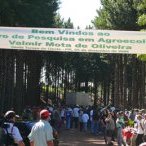
27 de octubre de 2010 | Noticias | Anti-neoliberalismo
Unpunished
Brazil: Murder of landless worker in Syngenta farm three years ago is still unpunished
Descargar: MP3 (1.5 MB)
His name was Valmir Mota de Oliveira, but everybody knew him as Keno. On October 21st, 2007, the leader of the Landless Rural Workers Movement of Brazil (MST) was murdered by officers of transnational seed company Syngenta, in a farm located in Parana State, where the corporation was conducting illegal tests with GMOs and agrotoxics.
The murder, as many others in the Brazilian countryside, is still unpunished, and there are no clear signs that this will change in the future. The day Keno was murdered, Isabel Cardin and other rural workers who were opposing Syngenta´s activities were also badly hurt.
According to MST´s website, this month a new civil action was filed to prove Syngenta´s responsibility in Keno´s death and Isabel´s attempt of murder.
Despite this, GMOs and Syngenta´s business continue moving forward in this South American country, and even public institutions such as EMBRAPA (the Brazilian Agricultural Research Corporation) are promoting alliances with Syngenta to develop sugarcane GM seeds.
“We can´t forget that Syngenta is to blame for Keno´s death. The company should have been expelled from Brazil for that!” said MST leader Janaina Stronzake, a few days ago in an interview with Bolpress.
Amid this process of impunity and pain there were also positive results. On December 5th, 2009, the Syngenta´s test field was turned into an agroecology center, and the over 3500 peasants that participated that day in the opening ceremony celebrated the event as a victory over the transnational corporation.
The new center was named Valmir Mota de Oliveira, and there is monument at the entrance that reads “Keno lives”.








